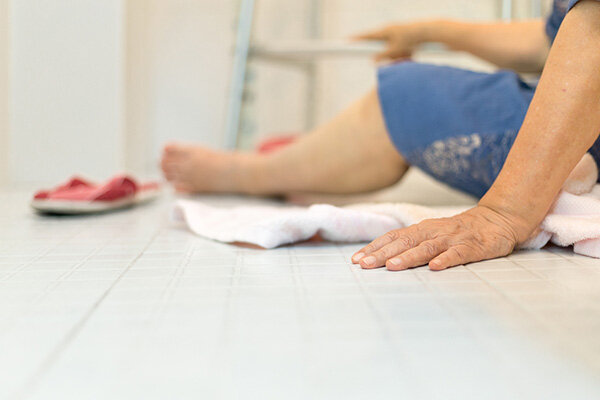Elderly Fall Prevention Tips You Should Know
Elderly Fall Prevention Tips You Should Know
For many older adults, the beginning of their end of life starts with a fall. A fall leads to a broken hip. The fractured bone leads to surgery. Surgery may lead to other complications like stroke or heart issues. Falls are tough on the elderly, but they sometimes can be prevented. What can you do to help prevent your loved one from having a bad fall? Read on to discover elderly fall prevention tips.
Declutter
Although it may sound obvious, one way to assure elderly fall prevention is to make sure your loved ones home or apartment is clean of clutter. Look for stacks of newspapers, books, and magazines sitting around your loved one’s favorite chair. Remove items like baskets and potted plants from steps that are inside the house and on the outside of the house.Depending on your relationship with this senior citizen, you may subtly mention the book The Gentle Art of Swedish Death Cleaning. There are other books on the market with similar messages, but reading something similar to this may put your loved one in the right frame of mind as you move things around his or her home. Not only will having fewer possessions simplify their lives, but it will also make their home safer.
Make sure there is adequate lighting
Make sure all the light bulbs and light fixtures are in working order for your loved one. Not only is it dangerous for senior citizens to move through an unlit house, but it is also dangerous for them to stand on a step stool or ladder to change a light bulb.Adequate lighting helps the elderly see if there are obstacles in the way as they move throughout the house. Keep in mind, many senior citizens wear bifocals to correct their vision. Wearing bifocals may cause your loved one to lose his or her depth perception. As people age, they also have a reduced ability to see color.Adequate lighting can’t make up for the fact that your loved one can’t see as well as they used to, but a well-lit area can enable them to see as much as possible.If your senior citizen lives alone, make sure they have a lighting plan in place to move throughout the house. Imagine your father turning off the light and the TV in the den, and then trying to make it through his dark house to his bedroom.While this task presented no issues when he was younger, as a senior citizen, the darkness may disorient your dad and may make moving through the house a struggle. Consider lighting the hallways with automatic nightlights or putting lamps on timers on strategic places throughout the house.
Get rid of the throw rugs
Ask an occupational therapist, and one of the first things they recommend when making a home safe for seniors is to throw away the throw rugs. Apparently, throw rugs account for many at-home falls. This includes rugs around bathtubs, showers, and sinks. Instead, purchase non-slip mats for these damp areas. They make slippery surfaces safer, but at the same time, they aren’t tripping hazards.
Check the flooring
Sometimes carpeting bunches up as it ages. Make sure the carpeting in your loved ones home is free of bumps. Also, inspect it for rips in the carpeting around thresholds. A foot can easily get caught in these rips and will take your loved one down to the floor.
Buy the right shoes
Make sure your senior citizen has shoes that are easy to get on and have non-slip soles. In other words, your loved one’s shoes should be easy to slip on, but not easy to slip on. Clear as mud?While on the subject of shoes, there are a variety of reasons to avoid shoes that tie. Not only are shoelaces tripping hazards, but they are also difficult for seniors to reach to tie. Rising quickly from this position may make your loved one lightheaded, and if they are lightheaded, they may be more of fall risk.If it is not feasible or comfortable for the elder in question to wear shoes, consider purchasing non-slip socks that have grippers on the bottom. If your loved one has spent any time in the hospital, chances are he or she has a pair or two of these fashionable socks already.
Monitor blood pressure
Sometimes senior citizens fall because they become lightheaded or dizzy. How can you keep that from happening to your loved one?As we age, our body has a difficult time regulating blood pressure as we stand. This low blood pressure may make him or her feel lightheaded. There are medications to treat this, so if you notice your loved one swaying as soon as he or she stands, you may want to mention this to the doctor.
Monitor blood sugar
Another reason a person may feel lightheaded is that their blood sugar is too low. Monitoring your loved one’s blood sugar not only helps them feel better, but it also may prevent them from feeling woozy as they stand.
Encourage hydration
If you are dehydrated, the volume of your blood goes down. This lowers your blood pressure and may cause you to feel dizzy. To keep your loved one from becoming dizzy from dehydration, make sure he or she has constant access to a lidded cup with a straw.
Install grab bars and handrails
Grab bars and handrails not only may keep your loved one from falling, but they may assist the senior citizen in standing. Grab bars can help one get on and off the toilet and in and out of the bathtub. Handrails along stairs cases are extremely necessary.If you are not handy, consider hiring someone to install the bars and rails throughout the home. A grab bar is only as good as how well it is attached to the wall. Grabbing onto a wobbly handrail while trying to maneuver down a staircase may do more harm than good.
Purchase non-slip canes or walkers
Let’s face it. Some people are hard headed. This is not a trait of only senior citizens, but of all people. We all know seniors who resist using walking aids such as canes or walkers because of pride. Even if your loved one insists that he or she doesn’t need such a tool, you may consider purchasing one anyway and just leaving it in the home. You may be surprised on your next visit to see Grandma use her cane as she greets you at the door.
Pride vs. safety
Encourage the use of canes or walkers. When they are sized and used correctly, canes and walkers can do much to limit senior citizens from falling. While we don’t want to hurt our loved one’s pride, we also want to help keep them independent and healthy for as long as possible.Studies show that nearly a third of all seniors in the U.S. fall each year, and about half of those falls take place at home. Help prevent these sometimes-deadly falls by monitoring the health of your loved one as well as paying attention to the safety of their homes.
